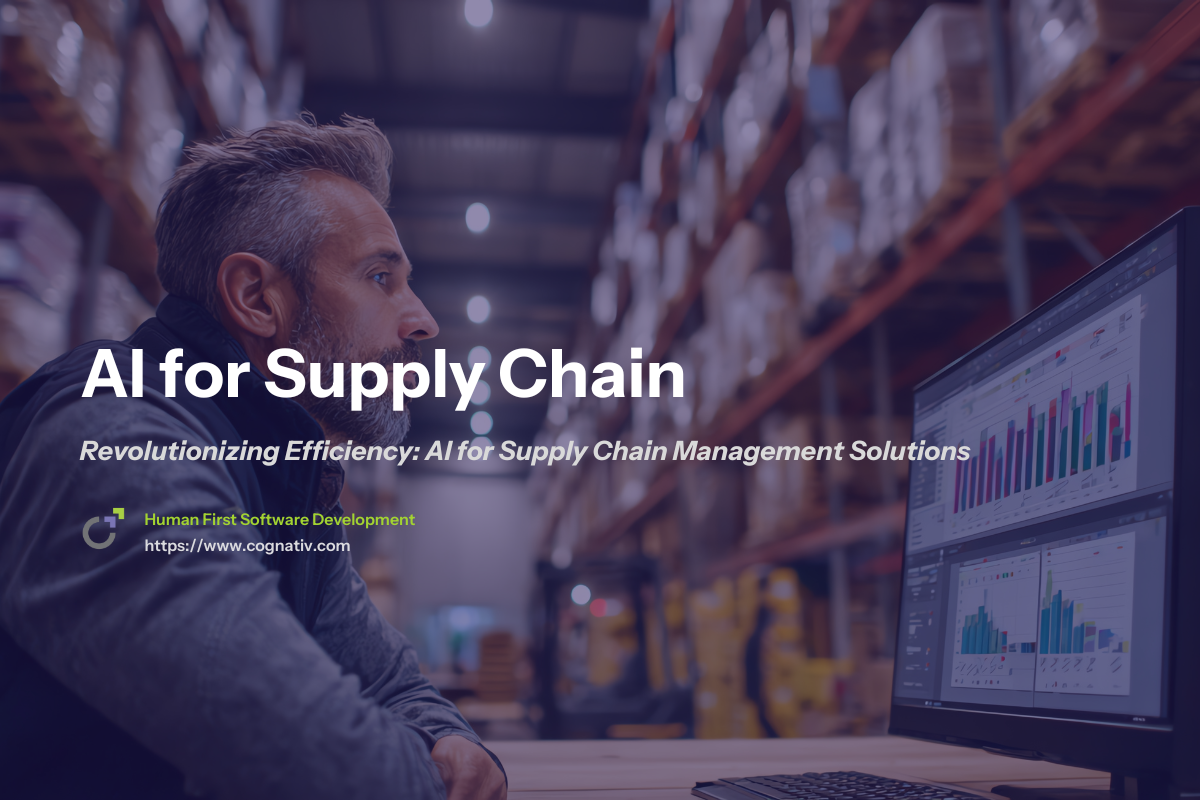Revolutionizing Efficiency: AI for Supply Chain Management Solutions
The global supply chain has become one of the most complex and dynamic networks in modern business. Rising demand volatility, geopolitical uncertainty, and capacity constraints have pushed companies to adopt artificial intelligence to build resilience, efficiency, and real-time adaptability.
AI in supply chain transforms planning and execution by:
Processing vast amounts of structured and unstructured data in real time
Improving decision making accuracy
Strengthening risk management strategies
Enhancing operational efficiency end-to-end
By combining machine learning, deep learning, natural language processing, and robotics, AI enables organizations to predict disruptions, optimize operations, and respond faster than traditional supply chain planning ever could.
Responsible AI (RAI) approaches—anchored in human oversight—ensure that these systems are transparent, ethical, and strategically aligned with business goals.

Strategic Benefits of AI Adoption in Supply Chain
Artificial intelligence (AI) combines advanced machine learning, natural language processing, and deep learning to process large volumes of data and transform supply chain operations with unprecedented intelligence and automation.
Enhanced Operational Efficiency
Automates repetitive tasks like inventory tracking, order fulfillment, and shipment monitoring
Reduces manual intervention and human error, cutting operational costs
Increases throughput and reduces lead times
Improved Risk Management
Uses AI models to detect early warning signals of disruptions
Enables proactive responses through alternative suppliers, rerouting, or inventory rebalancing
Strengthens supply chain resilience and business continuity
Smarter Decision Making
Processes real time data from multiple sources (demand, weather forecasts, logistics networks)
Provides supply chain planners with actionable, data-driven recommendations
Supports informed decisions that boost competitiveness
Greater Visibility and Responsiveness
Enables end to end visibility across logistics operations
Enhances adaptability in unpredictable market conditions
Helps companies stay ahead of disruptions and customer demand shifts

Core AI Capabilities in Supply Chain
Artificial intelligence (AI) combines advanced machine learning, natural language processing, and deep learning to process large volumes of data and transform supply chain operations with unprecedented intelligence and automation.
Predictive Intelligence
Machine learning models identify patterns in historical data and market trends.
Enhances forecasting accuracy and strategic planning, reducing uncertainty.
Process Automation
AI tools streamline order management, warehouse flows, and transportation networks.
AI technology improves labor allocation, cutting waste and boosting operational speed.
Optimization and Pattern Recognition
AI algorithms detect inefficiencies in supply chain operations.
Dynamic adjustments minimize operational costs, reduce bottlenecks, and accelerate response time.
Responsible AI (RAI)
Embeds governance and human oversight into automation workflows.
Mitigates bias and ensures transparency in decision making.
Enhances trust in AI adoption for mission-critical operations.

Key Applications of AI in Supply Chain
AI leverages natural language processing and other advanced techniques to extract relevant information and deliver valuable insights, enhancing decision making across supply chain operations.
1. Demand Forecasting
Demand forecasting is one of the most mature and impactful AI applications in supply chain management:
AI analyzes historical data and external factors like seasonality, weather, and macroeconomic signals.
Forecasting models minimize stockouts or overstocks and improve service levels.
Improved forecast accuracy leads to more stable inventory levels, cutting costs and increasing resilience.
Machine learning continuously updates predictions as market trends evolve.
2. Route Optimization
Efficient transportation is a cornerstone of modern logistics. AI in supply chain uses predictive analytics to:
Analyze traffic, weather, and delivery constraints in real time.
Optimize routing to reduce fuel consumption, emissions, and delivery delays.
Improve delivery times and customer satisfaction.
Strengthen last-mile agility in last mile delivery scenarios.
This capability is essential for logistics networks where time and cost efficiency are critical.
3. Autonomous Supply Chains
Autonomous supply chains represent the future of supply chain operations, merging AI capabilities with robotics and advanced analytics:
AI systems predict and mitigate potential disruptions before they impact production or distribution.
Autonomous decision loops optimize operations in real time.
Inventory optimization and demand-supply balancing happen with minimal human intervention.
Companies gain operational resilience, flexibility, and speed.
This is especially relevant for industries that require continuous uptime, like energy, defense, and e-commerce.
4. Predictive Maintenance and Sustainability
AI enables predictive maintenance, using data processing and pattern recognition to identify asset failures before they occur.
Reduces downtime and maintenance costs while extending equipment life.
AI-powered digital twins help simulate network performance and resource allocation, supporting green logistics strategies.
These systems also help companies reduce their environmental impact and meet ESG commitments.

How AI Strengthens Risk Management?
AI enhances risk management in the supply chain by integrating real-time alerts with strategic scenario planning:
AI systems monitor geopolitical, weather, and supplier risks simultaneously.
Companies can mitigate disruptions faster by identifying alternative suppliers or rerouting shipments.
Predictive models support risk mitigation strategies, improving agility in volatile markets.
This proactive risk posture creates a stronger, more resilient supply chain network.

Leveraging Generative AI and Advanced Technologies
Generative AI adds a new layer of intelligence to supply chain planning:
Creates optimized schedules and response scenarios for supply chain managers.
Generates “what-if” plans to adapt to changing market conditions.
Enhances collaboration between human experts and AI copilots.
The combination of machine learning, generative AI, and predictive analytics marks a turning point in the way companies run their logistics and sourcing functions.

From Manual Processes to AI-Powered Execution
The shift from traditional supply chain planning to intelligent automation requires:
Data Readiness — Integrating fragmented sources into a unified ecosystem.
AI Integration — Deploying ai tools across forecasting, routing, and procurement workflows.
Process Automation — Using AI algorithms to streamline supply chain operations.
Human Oversight — Ensuring responsible execution and transparent decision logic.
This evolution enables organizations to fine tune their operations, improve margins, and deliver faster to customers.

The Future: AI-Native Supply Chains
Tomorrow’s supply chain management will look drastically different:
Autonomous supply chains will operate with minimal manual intervention.
Last mile delivery will be optimized through real-time adaptive routing and robotics.
AI capabilities will make supply chains self-learning and predictive rather than reactive.
Companies will shift from responding to disruptions to anticipating and neutralizing them.
The combination of AI-powered decision making and sustainable operations positions companies for long-term growth.

Key Takeaways for Leaders
AI for supply chain is no longer experimental—it’s foundational.
The greatest gains come from integrating AI into demand forecasting, route optimization, and autonomous supply chains.
Risk management is strengthened when AI capabilities are paired with human intelligence and ethical governance.
Companies that leverage AI early and responsibly will stay ahead of disruption curves, improve margins, and scale sustainably.


